Introduction
In the fast-paced world of business, staying ahead often means staying informed. As we navigate the complexities of 2024, the value of a good book remains undiminished, especially for the business traveler. Whether you’re on a long-haul flight, waiting in an airport lounge, or unwinding in a hotel room, these seven books offer invaluable insights and strategies to sharpen your business acumen.
Here’s why these books are essential companions for business travelers in 2024:
- Portable Knowledge: Each book is a compact package of expertise, easily slipped into a carry-on or accessed on an e-reader. They’re designed to maximize your downtime, turning travel hours into productive learning opportunities.
- Diverse Perspectives: From habit formation to financial wisdom, from AI forecasts to startup strategies, these books cover a wide range of topics crucial for today’s business landscape.
- Timeless and Timely: While some of these books have been around for a few years, their principles remain relevant and have been proven effective, making them even more valuable in 2024’s business context.
- Practical Applications: These aren’t just theoretical texts. Each book offers actionable strategies and insights that you can start applying to your business practices immediately.
- Conversation Starters: In a world where networking is key, these popular business books provide excellent talking points for conversations with fellow travelers, potential clients, or business partners.
- Stress Reduction: Engaging with these books can help reduce travel-related stress by focusing your mind on productive, forward-thinking concepts rather than travel inconveniences.
- Inspiration on the Go: Travel can sometimes be draining, but these books are selected to reinvigorate your entrepreneurial spirit and spark new ideas, no matter where you are.
- Adaptability Enhancement: In the ever-changing business world of 2024, these books offer tools to help you stay adaptable and resilient in the face of new challenges.
- Global Perspective: As business becomes increasingly global, these books provide insights that are applicable across different markets and cultures.
- Time Efficiency: Chosen for their impactful content, these books ensure that your reading time is well-spent, offering high returns on your time investment.
As you embark on your business travels in 2024, consider these books your personal board of advisors. They’re ready to offer guidance, challenge your thinking, and potentially transform your approach to business. Whether you’re a seasoned executive, an aspiring entrepreneur, or somewhere in between, there’s wisdom in these pages for every stage of your business journey.
Remember, the most successful business leaders are often the most well-read. By incorporating these books into your travel routine, you’re not just passing time – you’re investing in your professional growth and staying ahead in the competitive business world of 2024.
So, fasten your seatbelt, adjust your reading light, and prepare to elevate your business mindset. Your next great business idea or solution might just be a page-turn away. Safe travels and happy reading!
7. Atomic Habits by James Clear
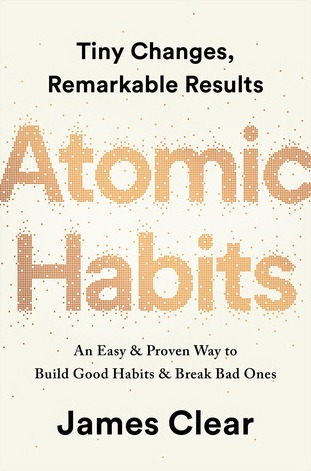
Genre: Self-Help / Business
Year of Publishing: 2018
“Atomic Habits” by James Clear is a transformative guide on how to build good habits and break bad ones through incremental changes. The book emphasizes the power of tiny adjustments, which, over time, can lead to remarkable improvements in personal and professional life. Clear introduces the concept of “atomic habits,” which are small, manageable habits that, when consistently applied, can lead to significant progress and success. The book is divided into four key principles: making habits obvious, attractive, easy, and satisfying. Clear combines practical strategies with scientific research and real-life examples to illustrate how small changes can lead to substantial results.
Things to Learn:
- The Power of Incremental Change: Clear highlights how making tiny, consistent improvements can lead to substantial long-term benefits. Instead of aiming for drastic changes, focusing on small, manageable adjustments can be more effective and sustainable.
- The Habit Loop: The book explains the habit loop, which consists of a cue, craving, response, and reward. Understanding this loop helps in designing effective habits by modifying the components to create positive outcomes and eliminate negative ones.
- The 1% Rule: Clear advocates for improving by just 1% each day. This small margin of improvement, when compounded over time, can lead to extraordinary results. This principle is particularly useful for busy travelers who need to make the most of limited time.
- Identity-Based Habits: One of the core concepts is to focus on who you want to become rather than what you want to achieve. By aligning habits with your desired identity, you make those habits a natural part of your life.
- Environment Design: Clear discusses the importance of shaping your environment to support good habits and hinder bad ones. For travelers, this means creating systems and environments that make it easier to stick to routines while on the go.
- Habit Stacking: The book introduces the technique of habit stacking, which involves linking a new habit to an existing one. This method helps integrate new habits seamlessly into daily routines, which is especially helpful for those with busy schedules.
- The 4 Laws of Behavior Change: Clear outlines four laws that are crucial for creating good habits and breaking bad ones: make it obvious, make it attractive, make it easy, and make it satisfying. Each law is supported with practical advice and strategies to apply in everyday life.
How It Will Help Busy Travelers:
“Atomic Habits” provides invaluable insights for busy travelers looking to optimize their productivity and personal growth. The principles of incremental change and habit stacking are particularly beneficial for those constantly on the move. By implementing small, manageable habits, travelers can maintain their productivity and well-being without overwhelming themselves. The focus on environment design and the 1% rule helps in adapting to new settings and routines, ensuring that travelers can seamlessly integrate effective habits into their diverse schedules. The book’s actionable strategies offer practical solutions to overcome the challenges of maintaining consistency while traveling, making it an essential read for those aiming to achieve both personal and professional success despite their busy lives.
Also read:
- Top 10 Leadership Books for Women Executives travelling
- Top 10 Books To Encourage You To Travel 2024
6. The Psychology of Money by Morgan Housel
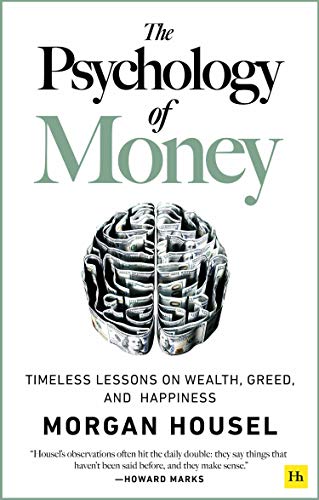
Genre: Personal Finance, Behavioral Economics
Year of Publishing: 2020
Synopsis:
Morgan Housel’s “The Psychology of Money” delves into the intricate relationship between money and human behavior. The book explores how personal experiences and psychological tendencies shape our financial decisions, often in ways that contradict traditional financial advice. Housel uses a series of engaging stories and lessons to illustrate how our emotions, biases, and social influences impact our financial outcomes. Unlike typical finance books that focus solely on strategies and formulas, this work emphasizes the importance of understanding the underlying psychological factors that drive financial behavior.
Housel’s approach is both accessible and insightful, making complex psychological concepts relevant to everyday financial decisions. He argues that financial success is not necessarily about knowledge or intelligence but rather about mastering the emotional and behavioral aspects of money management. The book is structured around a series of essays that tackle various themes, including risk, wealth, and happiness, offering readers practical wisdom on how to approach their finances with a balanced mindset.
Things to Learn:
- Behavioral Biases: Housel explains how cognitive biases such as overconfidence, optimism, and anchoring affect financial decisions. Understanding these biases can help you recognize and mitigate their impact on your financial choices.
- Long-Term Thinking: The book emphasizes the importance of long-term thinking in financial planning. Housel argues that patience and a long-term perspective are crucial for building and maintaining wealth.
- Risk Management: Housel discusses the concept of risk and how it is often misunderstood. He provides insights into managing risk effectively and making informed decisions even in uncertain situations.
- Financial Independence: The book explores the idea of financial independence and how it relates to personal happiness. Housel encourages readers to focus on what truly matters to them rather than chasing societal definitions of success.
- Storytelling Approach: Housel uses storytelling to convey his ideas, making complex financial concepts more relatable and memorable. This approach helps readers grasp important lessons without getting bogged down by technical jargon.
- Emotional Impact of Money: The book delves into the emotional side of money, including how it influences our behavior and relationships. It offers strategies for managing the psychological aspects of wealth and financial stress.
- Wealth Building vs. Income: Housel differentiates between wealth and income, emphasizing that building wealth involves more than just earning a high salary. It requires prudent management, saving, and investing.
How It Will Benefit Busy Travelers:
- Practical Insights: For busy travelers, “The Psychology of Money” offers practical advice that can be applied regardless of where they are. Its focus on behavior rather than technical finance makes it easy to digest and implement on the go.
- Quick Read: The book’s essay format allows readers to engage with individual sections without needing to read it cover-to-cover in one sitting, making it ideal for travel.
- Emotional Resilience: Understanding the psychological aspects of money can help travelers manage financial stress and make more mindful decisions, enhancing their overall travel experience.
- Balanced Perspective: The book provides a balanced view of wealth and success, helping travelers align their financial goals with their personal values and life priorities.
Overall, “The Psychology of Money” offers valuable insights into the human side of finance, making it a must-read for busy travelers who want to make smarter financial decisions while navigating their journeys.
5.AI 2041: Ten Visions for Our Future by Kai-Fu Lee and Chen Qiufan
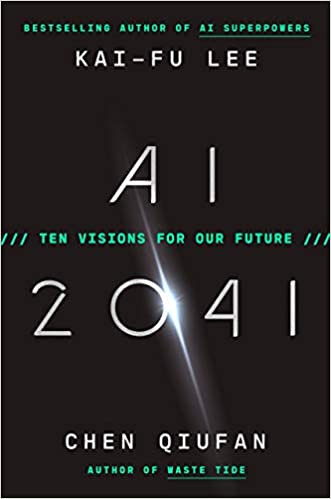
Genre: Non-Fiction, Technology, Future Studies
Year of Publishing: 2021
Synopsis: “AI 2041: Ten Visions for Our Future” is a compelling exploration of the potential impact of artificial intelligence over the next two decades. Co-authored by Kai-Fu Lee, a renowned AI expert, and Chen Qiufan, a science fiction writer, the book presents a unique blend of technology and narrative fiction. It combines ten visionary stories with insightful analysis, offering readers a glimpse into how AI might transform various aspects of our lives by 2041.
Each chapter features a fictional story set in a future shaped by AI innovations, followed by a non-fiction analysis that explains the technology behind these scenarios and its implications. The book covers diverse themes such as the evolution of work, education, health, and social interactions, providing a comprehensive look at both the opportunities and challenges AI presents.
Things to Learn:
- Understanding AI Innovations: The book provides a deep dive into the various AI technologies expected to emerge and evolve in the coming years. Readers will gain insights into cutting-edge advancements such as AI-driven medical diagnostics, autonomous vehicles, and intelligent personal assistants.
- Implications for Business: “AI 2041” explores how AI will reshape business practices, from automating routine tasks to enabling more sophisticated data analysis. It highlights how businesses can leverage AI for competitive advantage, innovate their product offerings, and optimize operations.
- Ethical Considerations: The book addresses the ethical dilemmas associated with AI, such as privacy concerns, bias in algorithms, and the impact of automation on employment. Understanding these issues is crucial for making informed decisions about AI integration in business strategies.
- Future Trends: By analyzing the potential trajectories of AI development, the book helps readers anticipate future trends and prepare for shifts in the business landscape. It offers practical advice on how to stay ahead of the curve and adapt to technological changes.
- Personal Development: For busy travelers, the book provides valuable insights into how AI might influence various aspects of daily life, including work-life balance and personal productivity. Understanding these trends can help travelers make informed choices about technology use and manage their time more effectively.
- Scenario Planning: The book’s blend of fiction and analysis encourages readers to think creatively about possible futures and plan for various scenarios. This approach fosters strategic thinking and helps businesses and individuals prepare for a range of potential outcomes.
“AI 2041: Ten Visions for Our Future” is a must-read for anyone interested in the future of technology and its impact on business and society. Its engaging storytelling combined with expert analysis provides a comprehensive understanding of how AI will shape our world and offers practical insights for navigating this transformative era. Whether you are a business professional, an entrepreneur, or simply curious about the future, this book offers valuable knowledge and inspiration for the road ahead.
4. Zero to One by Peter Thiel
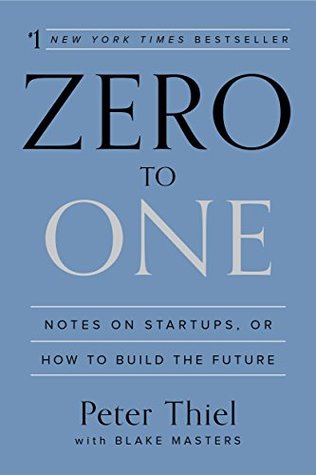
Genre: Business, Entrepreneurship, Innovation
Year of Publishing: 2014
Synopsis: “Zero to One: Notes on Startups, or How to Build the Future” is a business book authored by Peter Thiel, co-founder of PayPal and Palantir Technologies, and a prominent venture capitalist. The book provides a comprehensive guide on how to create innovative startups that drive progress and create entirely new industries rather than merely improving existing ones.
In “Zero to One,” Thiel argues that to achieve meaningful success, businesses must move from “zero to one,” meaning they should create something truly novel rather than competing in existing markets. He contrasts this with the concept of going from “one to n,” which is about scaling up existing ideas. Thiel emphasizes that the most successful entrepreneurs and companies are those that build unique value propositions and solve new problems in groundbreaking ways.
The book is structured around Thiel’s perspectives on innovation and entrepreneurship, supported by anecdotes from his experiences and observations of successful startups. It explores how entrepreneurs can identify and capitalize on opportunities to create monopolies and build lasting, impactful companies.
Things to Learn:
- The Power of Innovation: Thiel emphasizes the importance of innovation that goes beyond incremental improvements. He encourages entrepreneurs to think in terms of creating something entirely new—a new product, service, or technology—that fundamentally changes the landscape.
- Building Monopolies: One of the core concepts in the book is the idea that successful startups should aim to create monopolies. According to Thiel, monopolies arise from offering something so unique and valuable that no other competitors can provide a similar product or service. This leads to a dominant market position and sustained success.
- The Importance of Vision: Thiel advocates for having a clear and ambitious vision for your business. He argues that entrepreneurs should focus on solving significant problems and making a substantial impact rather than simply competing in established markets. A compelling vision can drive innovation and attract top talent.
- The Role of Technology: The book highlights how technological advancements can drive business success. Thiel discusses how technology not only improves existing products but also creates entirely new categories of products and services. He provides insights on leveraging technology to build transformative companies.
- The Value of Contrarian Thinking: Thiel encourages readers to challenge conventional wisdom and think differently from the crowd. He believes that contrarian thinking—questioning popular beliefs and exploring unconventional ideas—can lead to groundbreaking innovations and business success.
- Team Dynamics and Culture: The book explores the importance of assembling a strong team and fostering a culture of collaboration and innovation. Thiel stresses that a successful startup relies not only on the idea but also on the people who drive and execute it.
- Long-Term Thinking: Thiel emphasizes the need for long-term thinking in building a business. He argues that entrepreneurs should focus on creating lasting value and impact rather than seeking quick gains or short-term success.
How It Will Help Busy Travelers: “Zero to One” is a valuable read for busy travelers looking to gain insights into entrepreneurship and innovation. Its concise yet profound lessons on creating unique value propositions and building successful businesses are ideal for those who need inspiration and practical advice while on the go. The book’s focus on visionary thinking and long-term success provides actionable strategies for entrepreneurs and business leaders, making it a great companion for anyone looking to navigate the world of startups and innovation.
3. The Lean Startup by Eric Ries
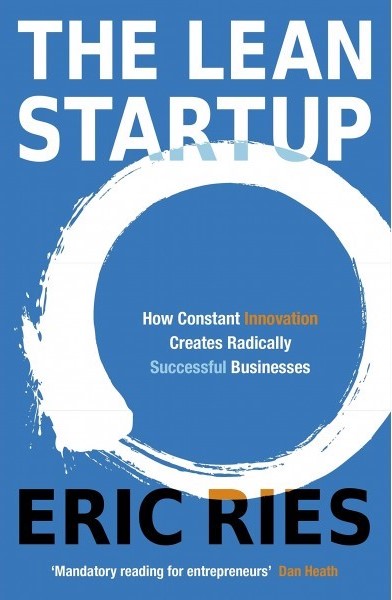
Genre: Business / Entrepreneurship
Year of Publishing: 2011
Synopsis: Eric Ries’ “The Lean Startup” is a groundbreaking guide for entrepreneurs looking to innovate and succeed in today’s rapidly changing business environment. The book introduces the concept of the lean startup methodology, which focuses on efficient product development and market testing to build successful businesses. Ries emphasizes the importance of adapting to changes quickly and learning from failures rather than sticking rigidly to initial plans.
The book is structured around three main principles:
- Build-Measure-Learn: Entrepreneurs are encouraged to develop a minimum viable product (MVP) and test it in the market to gather feedback. This iterative process allows for continuous improvement based on real-world data.
- Validated Learning: Rather than relying on traditional business plans, the lean startup approach advocates for learning through experimentation and adjusting strategies based on what is learned from the market.
- Innovative Accounting: Ries introduces metrics that help businesses track progress and make informed decisions, ensuring that resources are used efficiently and that the startup remains on a path to success.
“The Lean Startup” is a must-read for busy travelers who are entrepreneurs or aspiring business leaders. It offers actionable insights and practical advice that can be applied to various business contexts, whether you’re on the go or working remotely.
Things to Learn:
- Minimum Viable Product (MVP):
- Understanding the concept of MVP helps in launching a product quickly with the essential features needed to meet customer needs. This approach minimizes risk and allows for faster market entry.
- Iterative Development:
- Learn how to apply the build-measure-learn loop to your business processes. By continuously testing and refining your product based on customer feedback, you can improve your offerings more effectively.
- Pivot or Persevere:
- Discover how to make data-driven decisions about whether to pivot (change direction) or persevere (stay on the current path) based on market response. This approach helps in adapting to market demands and avoiding unnecessary failures.
- Customer Feedback:
- The book emphasizes the importance of gathering and analyzing customer feedback to validate assumptions and improve your product. This method ensures that you are meeting actual market needs rather than relying on guesswork.
- Metrics and Measurement:
- Learn how to establish key performance indicators (KPIs) and use metrics to track progress. Innovative accounting techniques help in making informed decisions and assessing the effectiveness of your strategies.
- Lean Thinking:
- Embrace lean thinking principles to streamline operations, reduce waste, and focus on activities that add value. This mindset is crucial for maintaining efficiency and scalability in a startup environment.
- Rapid Experimentation:
- The book advocates for a culture of experimentation where hypotheses are tested quickly, and failures are seen as learning opportunities. This approach accelerates growth and innovation.
How It Will Benefit Busy Travelers:
For busy travelers, “The Lean Startup” provides a flexible and efficient approach to managing and growing a business while on the move. Its principles can be applied to various business scenarios, enabling you to test ideas and make decisions with limited resources and time. The book’s emphasis on adaptability and continuous learning ensures that you can navigate the complexities of entrepreneurship even with a busy travel schedule. By implementing the lean startup methodology, you can manage your business more effectively, respond to market changes promptly, and achieve sustainable success.
2. Never Split the Difference by Chris Voss
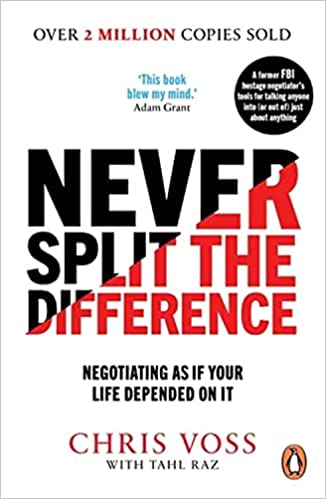
Genre: Business, Negotiation, Psychology
Year of Publishing: 2016
Synopsis: “Never Split the Difference: Negotiating As If Your Life Depended On It” by Chris Voss, a former FBI hostage negotiator, delves into the art of negotiation with insights derived from real-life high-stakes scenarios. Voss, drawing from his extensive experience in negotiating with terrorists and criminals, presents a set of powerful techniques designed to enhance negotiation skills in any context, whether professional or personal. The book emphasizes the psychological aspects of negotiation, focusing on strategies that ensure success by understanding and influencing human behavior.
Voss introduces readers to the concept that traditional negotiation tactics, often centered around compromise and splitting the difference, are not always effective. Instead, he advocates for a more nuanced approach that involves active listening, tactical empathy, and emotional intelligence. The book is structured around practical advice and real-life examples, offering readers actionable techniques that can be applied in various business situations, making it a valuable resource for busy professionals and travelers who need to negotiate effectively on the go.
Things to Learn:
- Tactical Empathy: Voss emphasizes the importance of understanding the other party’s perspective and emotions. By recognizing and validating their feelings, negotiators can build rapport and gain trust, which is crucial for achieving favorable outcomes.
- Mirroring and Labeling: The book introduces techniques like mirroring (repeating the last few words the other party has said) and labeling (identifying and verbalizing the other party’s emotions). These methods help in creating a connection and encouraging the counterpart to open up and share more information.
- The Power of “No”: Voss explains that getting a “no” early in the negotiation process is not necessarily a setback. Instead, it can provide clarity and set the stage for more productive discussions. He discusses how to handle rejection and use it as a tool for uncovering the other party’s true needs and motivations.
- Accusation Audit: This technique involves addressing potential objections or concerns before the other party brings them up. By preemptively acknowledging these issues, negotiators can diffuse tension and demonstrate their understanding of the other party’s perspective.
- The Black Swan Theory: Voss introduces the concept of “Black Swans”—unpredictable and critical pieces of information that can dramatically change the course of a negotiation. He advises being vigilant and open to discovering these hidden factors that could impact the negotiation outcome.
- Effective Use of Questions: The book emphasizes the use of open-ended questions to elicit valuable information and steer the negotiation process. Techniques such as “How” and “What” questions help in gaining deeper insights and understanding the other party’s position.
- Creating a “Best Alternative to a Negotiated Agreement” (BATNA): Voss advises having a solid backup plan or alternative options. Knowing your alternatives helps in negotiating from a position of strength and ensures you have viable options if the negotiation does not proceed as planned.
Conclusion: “Never Split the Difference” provides a comprehensive guide to mastering negotiation through psychological insights and practical techniques. Chris Voss’s unique perspective as a former FBI negotiator offers valuable lessons for busy travelers and professionals who need to negotiate effectively in diverse and often challenging situations. The book equips readers with tools to enhance their negotiation skills, build stronger connections, and achieve better outcomes, making it an essential read for those looking to excel in both business and personal negotiations.
1.Deep Work by Cal Newport
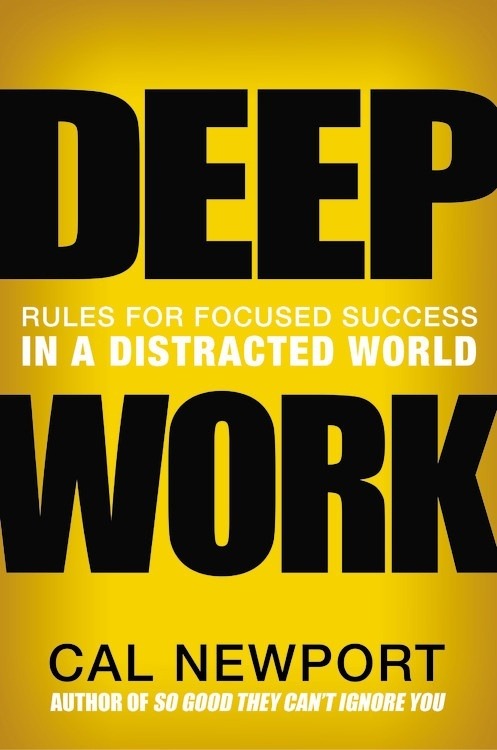
Genre: Non-Fiction / Business / Productivity
Year of Publishing: 2016
Synopsis: “Deep Work” by Cal Newport explores the concept of “deep work,” a state of focused and undistracted work that allows individuals to produce high-quality results in less time. Newport argues that in our increasingly distracted world, cultivating the ability to perform deep work is crucial for achieving professional and personal success. The book is divided into two parts: the first part explains the importance and benefits of deep work, while the second part provides practical strategies for developing and maintaining this state of focus.
In “Deep Work,” Newport highlights how modern distractions, such as social media and constant connectivity, have fragmented our attention and diminished our ability to engage in deep, meaningful work. He contrasts this with the advantages of deep work, which include higher productivity, greater learning, and more fulfilling work experiences. Newport uses a variety of examples from successful professionals across different fields to illustrate how deep work can lead to extraordinary results.
Things to Learn:
- The Concept of Deep Work: Newport defines deep work as professional activities performed in a state of distraction-free concentration that push your cognitive capabilities to their limit. He contrasts this with “shallow work,” which consists of non-cognitively demanding tasks that are often performed while distracted. Understanding this distinction helps readers appreciate the value of focused work versus surface-level tasks.
- The Value of Deep Work: The book emphasizes how deep work can lead to increased productivity, better quality output, and more substantial learning. Newport argues that mastering this skill can set you apart in any professional field, making you more competitive and successful.
- Practical Strategies: Newport offers several actionable strategies for cultivating deep work, including:
- Work Deeply: Create routines and rituals to minimize distractions and foster an environment conducive to deep work.
- Embrace Boredom: Train your brain to handle periods of boredom without resorting to distractions.
- Quit Social Media: Evaluate and limit the use of social media to reduce interruptions and maintain focus.
- Drain the Shallows: Reduce time spent on shallow tasks by scheduling and batching them to minimize their impact on your deep work sessions.
- Implementing Deep Work in Your Routine: Newport provides practical advice on how to incorporate deep work into a busy schedule. This includes setting clear goals, establishing a work routine, and prioritizing tasks to ensure that deep work gets the attention it deserves.
- Balancing Work and Life: Newport addresses how to balance deep work with other responsibilities, suggesting that a well-structured schedule and clear boundaries can help maintain focus while managing personal and professional commitments effectively.
Relevance for Busy Travelers: For busy travelers, “Deep Work” offers valuable insights on how to maximize productivity and focus despite a demanding schedule. The book’s strategies are particularly useful for professionals who need to stay productive while on the move, providing actionable steps to achieve deep work even in transient environments. Newport’s emphasis on reducing distractions and optimizing work habits can help travelers maintain high performance and manage their workload efficiently, making it an essential read for those juggling work and travel.



